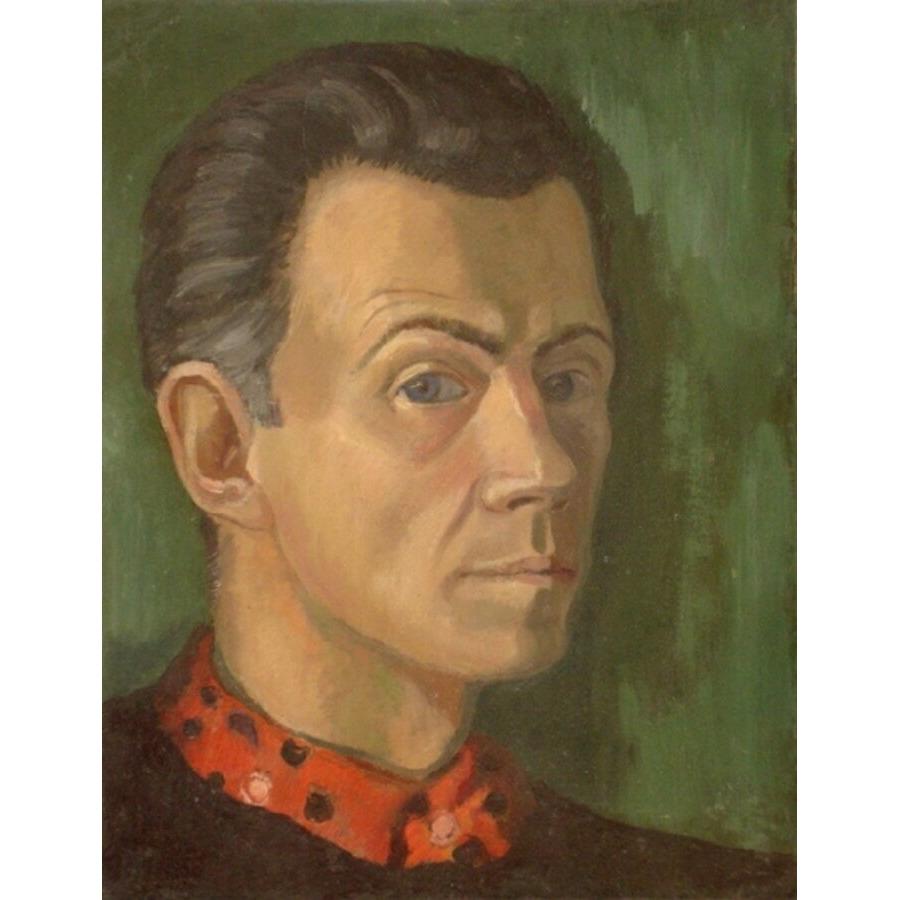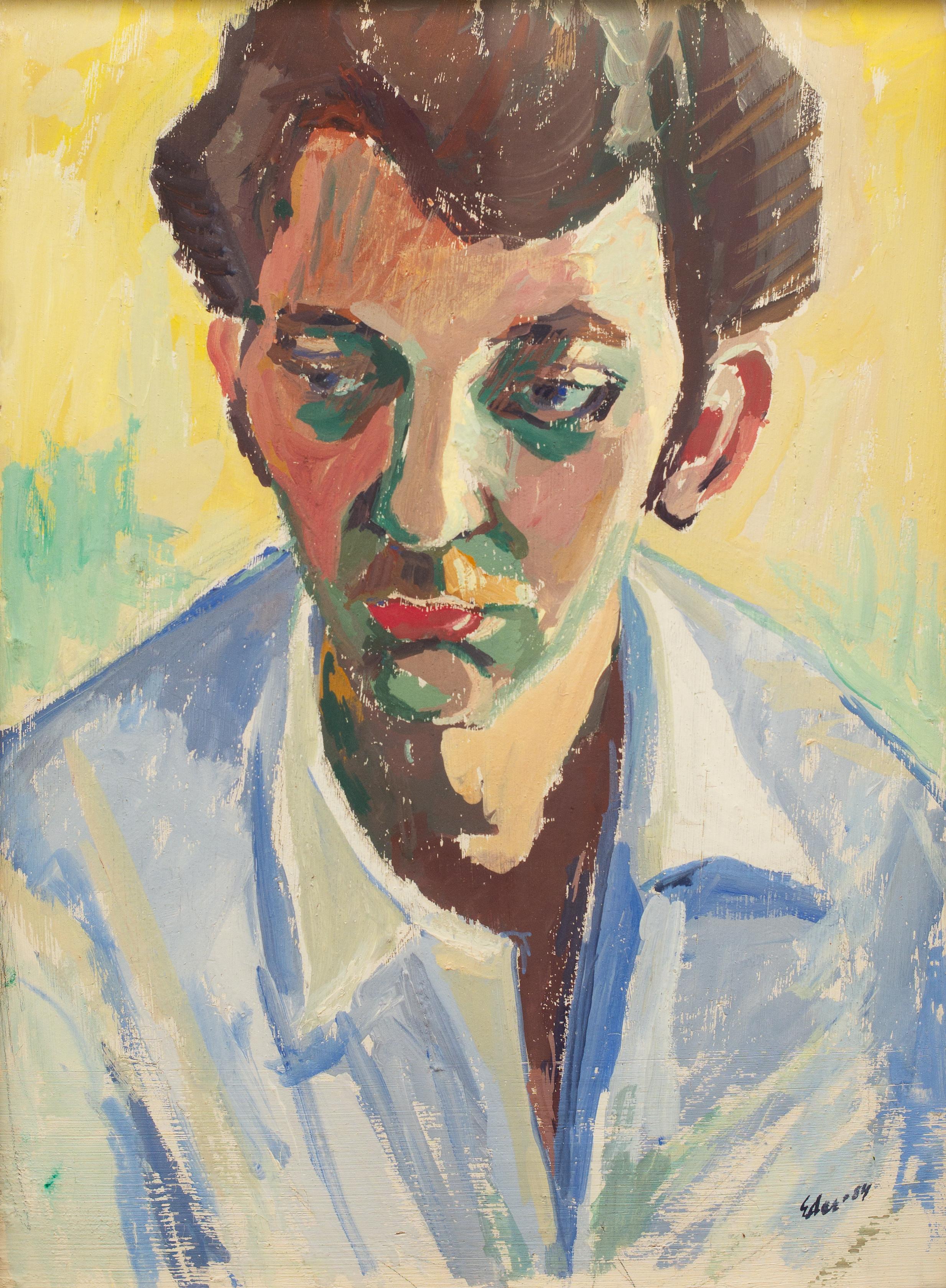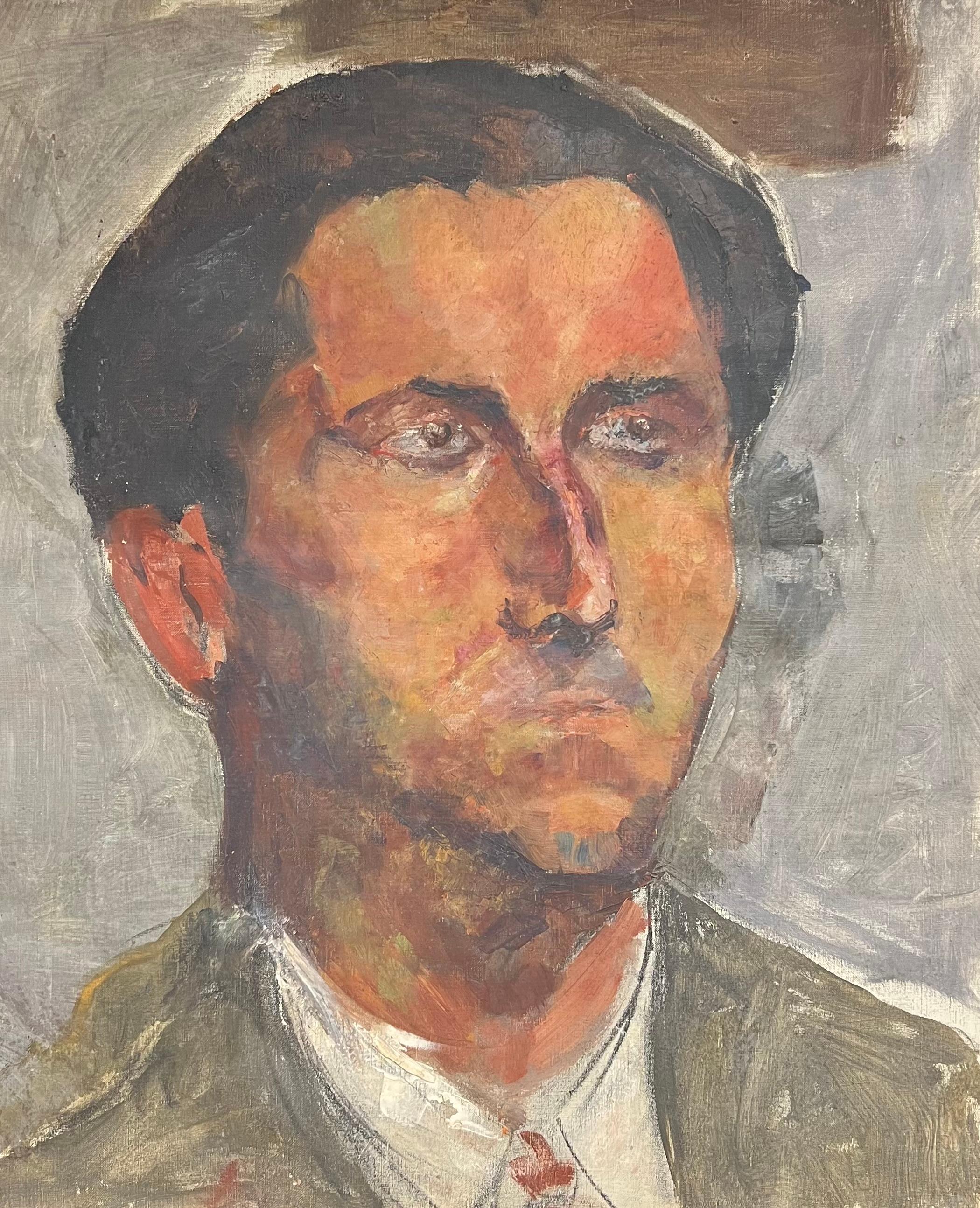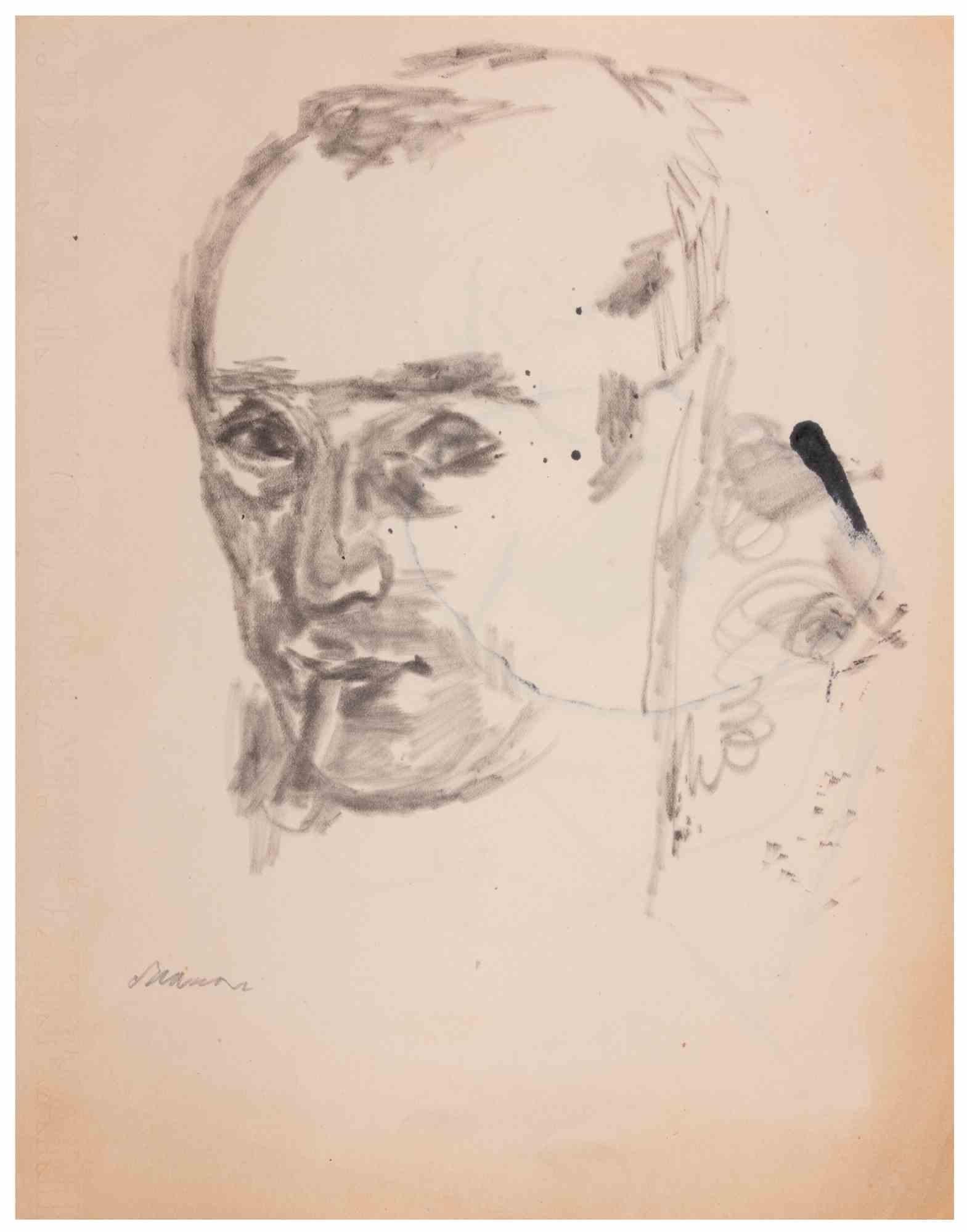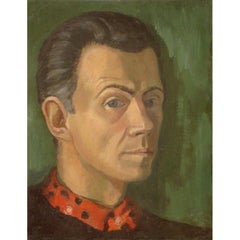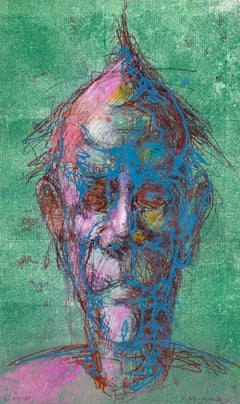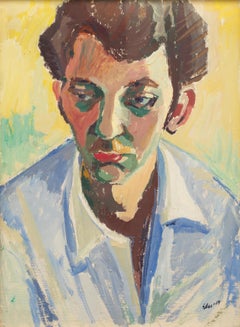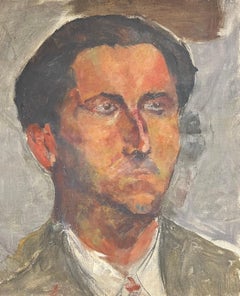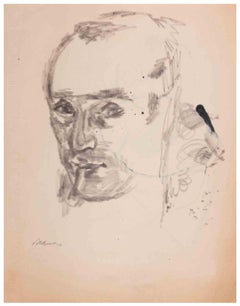Items Similar to Self-portrait. 1960, paper, mixed technique, 29.5x20 cm
Want more images or videos?
Request additional images or videos from the seller
1 of 2
Adolfs ZardinshSelf-portrait. 1960, paper, mixed technique, 29.5x20 cm1960
1960
$856.11
$1,070.1420% Off
£642.15
£802.6920% Off
€720
€90020% Off
CA$1,195.13
CA$1,493.9120% Off
A$1,294.47
A$1,618.0820% Off
CHF 685.61
CHF 857.0120% Off
MX$15,661.12
MX$19,576.4020% Off
NOK 8,619.15
NOK 10,773.9320% Off
SEK 8,034.88
SEK 10,043.6020% Off
DKK 5,484.83
DKK 6,856.0420% Off
About the Item
Adolfs Zardins
(1890 08 II Riga, Latvia – 1967 07 II Jurmala, Latvia), painter.
Only in 1990 his relatives give his artistic heritage to publicity.
“I am 58, and in five Years my colors and lines will be genuinely perfect…”
“I don’t obey anything expert myself and my time…”
Indeed, he strictly followed this rule, set up by himself; he lived and created as an outsider, obeying only himself and his time, more accurately – his inner time. And he died without being known and acknowledged by his contemporaries. Adolfs Zardinsh – an artist whose creative work has no analogues in Latvian art history of the XX century. This may seem strange, but may seem strange, but maybe it is only natural that we have only fragmentary information about his life. The beginnings are to be sought during the WWI when the family of his father, Peteris Zardins, moved from Vecpiebalga (Latvia) to Vitebsk (Russia). There is a reason to assume that the development of the artistic personality of young Adolfs Zardinsh was influenced by the bustling art life in Vitebsk. As we know, after October 1917, there lived and worked such artists as Marc Chagall, Kazimir Malevich, Mstislav Dobuzhinski, Robert Falk, Janis Tillbergs, a. o. So, it might not be a coincidence that art critics have discovered the influence of M. Chagall in A. Zardinsh’ art works. About 1920, after his return from Vitebsk to Latvia, A. Zardinsh settles down at his sister’s place not far from Riga, at the Riga Bay, and stays there until the and of his days, leading a solitary life and creating frescoes, histrionic compositions, landscapes, portraits. Participation at there exhibitions of the Independent Artist’s union in Riga (1931, 1933, 1935) doesn’t make him famous or acknowledged. His friendship with the Lithuanian painter Vladas Eidukiavicius doesn’t help Adolf Zardinsh to enter the established artistic circle. He still stays the stubborn hermit whose authorities in art are Rembrandt and Velasquez. He takes over some stylistic elements from his favorite art styles French fauvists, German expressionists, Russian neo – primitivisms.
Nothing can divert him from his way - neither the fare with destroys many works, nor the deep poverty verging on hunger. If tacking money for good paints, the artist used the ones he has, if there is no paper or canvas, he paint on any background, frugally and carefully. If the composition does not satisfy him, he cuts the ready work in pieces and, using them, creates a new one.
His themes stay the years – high society, casino and theatre, genre scenes and erotica. Year by year the art works by A. Zardinsh turn move refined, his compositions – more harmonious, the choice of colors – more perfect. Many of his works can easily compete with masterpieces seen at famous museums.
He drew and painted since childhood, because he was born in a very intelligent family, where education was respected. His father dead at artist’s childhood and mother with 6 children moved to Vitebsk (1910 – 1917). In 1920, Zardins with his family returned to Riga.
He attended the Studio of Independent Artists and took part at all exhibitions, which were organised by this studio (1931, 1933, 1935). During these years, he painted a lot and draw with aquarelle and pastel small pictures and wrote idiomatic “diary”. After the 2nd World War he lived in cold and hunger, without decent materials for work. He is an individualist who lived in his own reality.
His works are full of classic themes (history, mythology, religion and erotics) but interpretation is paradoxical, associative, allegoric and also subjective. Zardins in his works created so-called “individual mythology”.
- Creator:Adolfs Zardinsh (1890 - 1967, Latvian)
- Creation Year:1960
- Dimensions:Height: 11.62 in (29.5 cm)Width: 7.88 in (20 cm)
- Medium:
- Movement & Style:
- Period:
- Framing:Framing Options Available
- Condition:
- Gallery Location:Riga, LV
- Reference Number:1stDibs: LU1437214868772
About the Seller
5.0
Gold Seller
Premium sellers maintaining a 4.3+ rating and 24-hour response times
Established in 2002
1stDibs seller since 2020
202 sales on 1stDibs
Typical response time: 13 hours
- ShippingRetrieving quote...Shipping from: Riga, Latvia
- Return Policy
More From This Seller
View AllDynamic self-portrait. 1972. Cardboard, oil, 37x36, 5 cm + gift book
By Vladimir Glushenkov
Located in Riga, LV
Dynamic self-portrait. 1970, cardboard, oil, 37x36,5 cm + gift book about artist Vladimirs Glušenkovs
Painting published in the book "Vladimirs Glušenkovs", Ed .: Neputns, 2018, on L...
Category
1970s Impressionist Portrait Paintings
Materials
Cardboard, Oil
$2,815 Sale Price
20% Off
Self-portrait. Oil on cardboard, 37x29 cm
By Olgerts Saldavs
Located in Riga, LV
Olģerts Saldavs (1907.29.VII – 1960.1.IV) - Painter, art scholar.
Studied in the studio of U. Skulme, later of K. Miesnieks and L. Liberts (1926). In 1936, he graduated from the V. ...
Category
1950s Impressionist Portrait Paintings
Materials
Oil, Cardboard
$856 Sale Price
20% Off
Portrait. 1961. Watercolor on paper, 29, 5x21 cm
Located in Riga, LV
Portrait. 1961. Watercolor on paper, 29,5x21 cm
Dzidra Ezergaile (1926-2013)
Born in Riga. School years alternate with summer work in the countryside. In 1947, she began her studies...
Category
1960s Impressionist Portrait Drawings and Watercolors
Materials
Paper, Watercolor
PCY-0/73/1389, paper/canvas, monotype, author's technique, 40.5x28 cm
Located in Riga, LV
PCY-0/73/1389, paper/canvas, monotype, author's technique, 40.5x28 cm
Category
1980s Symbolist Figurative Drawings and Watercolors
Materials
Paper, Canvas, Pastel, Acrylic
Youth self - portrait. 1942, paper, watercolour, 15.3x23.5 cm
Located in Riga, LV
Adolfs Zardins
(1890 08 II Riga, Latvia – 1967 07 II Jurmala, Latvia), painter.
Only in 1990 his relatives give his artistic heritage to publicity.
“I am 58, and in five Years my c...
Category
1940s Abstract Portrait Drawings and Watercolors
Materials
Paper, Watercolor
$1,712 Sale Price
20% Off
Portrait. Paper, pastel, 35.5x23 cm
Located in Riga, LV
Portrait. Paper, pastel, 35.5x23 cm
The composition focuses on portraying the facial features and characteristics of a man. The artist has employed a linear style, using bold and de...
Category
20th Century Modern Figurative Paintings
Materials
Paper, Pastel
$903 Sale Price
20% Off
You May Also Like
Portrait of a Man by Swedish Artist Martin Eder, 1954, Gouache on Masonite
By Martin Eder
Located in Stockholm, SE
Martin Eder was a Swedish drawing teacher, artist and ceramicist. Martin was born on the island of Gotland and spent a lot of time there, he also lived in Sala. Martin was a curious ...
Category
1950s Expressionist Mixed Media
Materials
Masonite, Gouache
Expressive Male Portrait Mid-20th Century French Oil Painting
Located in Cirencester, Gloucestershire
Expressive Male Portrait
French, mid 20th century
from the studio collection of Simone Forge (1930's-1950's female French artist)
oil on canvas, unframed
Canvas: 24 x 19.75 inches
Pr...
Category
Mid-20th Century Impressionist Figurative Paintings
Materials
Oil
VAN BIESBROECK Jules. Portrait of a man. Oil sketch on cardboard.
By Jules Pierre van Biesbroeck
Located in Paris, FR
Portrait of a man. Oil sketch on cardboard. Unsigned.
This work will be recorded in the catalogue raisonné of the work of the artist currently in preparation.
Jules Van Biesbroeck was the son of Jules Evariste van Biesbroeck, a painter of Ghent, but was born in Italy, in Portici, near Naples, while his parents were staying there. (In the 19th century many artists made educational trips to Italy). It was a long visit: the child was two years old by the time the family returned to Ghent.[1]
After a short period of practice with his father, van Biesbroeck was enrolled in the Academy of Fine Arts in Ghent. His first painting, "The Shepherd" (French: Le pâtre), was sold at the Triennale in Ghent. In 1888, when he was only 15 years old, he made his debut at the "Salon des Champs-Elysées" in Paris with his monumental work "The Launch of the Argo" (French: Le lancement...
Category
Early 20th Century Impressionist Portrait Paintings
Materials
Oil
Self Portrait - Drawing by Mino Maccari - mid-20th Century
By Mino Maccari
Located in Roma, IT
Charcoal drawing on paper realized by Mino Maccari in the mid-20th Century.
Hand signed lower left.
Very good condition.
Category
Mid-20th Century Modern Figurative Drawings and Watercolors
Materials
Watercolor
$523 Sale Price
20% Off
Portrait - Drawing by Joseph Alexander Colin - Mid-20th Century
Located in Roma, IT
Portrait is a drawing realized by Joseph Colin in the Mid-20th Century.
Pencil on ivory-colored paper
Good conditions with slight foxing.
The artwork is realized through deft expr...
Category
Mid-20th Century Modern Figurative Drawings and Watercolors
Materials
Paper, Pencil
Portrait - Original Tempera on Paper - Mid-20th Century
Located in Roma, IT
Portrait is an original modern painting in tempera on paper realized by an Anonymous artist of the mid-20th Century.
.
Monogrammed, illegible...
Category
Mid-20th Century Contemporary Figurative Paintings
Materials
Tempera
More Ways To Browse
Turkish Portrait
1835 Portrait
Gay Portrait
Giovanni Francesco Barbieri
Jozef Israels
Oliver Samsinger
Portrait Mourning
Portrait Of Bishop
The Lacemaker
The Red Boy
Vintage Condoms
17th Century Dress
Andre Monet
Elizabeth Taylor Painting
Franco Zeffirelli
Franz Xaver Winterhalter
Indian Portrait Oil Painting
Oil Portrait General
